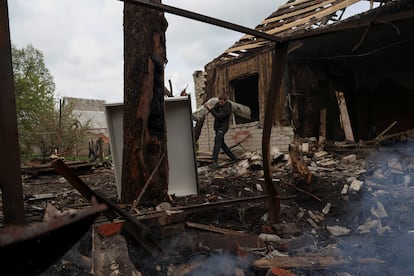EU and US divided on the next sanctions against Russia over war in Ukraine
Washington wants a full ban on exports to Moscow with few exceptions, while Brussels is proposing tools to deter the countries that are helping the Kremlin circumvent restrictions

The West’s margin to impose measures aimed at corralling the Russian economy and prevent it from further fueling the war in Ukraine is getting smaller and smaller. The pace of decision-making has slowed, and Kyiv’s Western allies are now divided on what steps to take next. The sanctions on Moscow are working and impacting the Russian economy, albeit more slowly than expected.
However, Russia has been able to find ways to circumvent the sanctions by importing and exporting goods via third countries. The United States wants to plug these holes with a total ban on exports to Russia, but the EU — which is more in favor of applying restrictions sector by sector — believes that this approach is not viable. It instead wants to design better anti-circumvention tools, and is exploring the idea of establishing a mechanism to deter countries from helping Russia evade restrictions.
According to Bloomberg News and EU sources, Washington — frustrated by the loopholes that allow Moscow to receive Western technology that may have both civilian and military uses — is calling on the G7 (the U.S., U.K., France, Germany, Italy, Japan and Canada) and the EU to agree to a total veto on exports to Russia, with exceptions in the agricultural and pharmaceutical sectors.
But while some nations may believe a total ban will send a strong and highly symbolic message to Moscow, the measure would not receive the greenlight from the 27-member bloc. Indeed, such a move is not considered “sustainable,” according to EU sources involved with the negotiations ahead of the G7 leaders’ meeting in Hiroshima (Japan) in mid-May. Even if the ban were to go ahead, agreeing on the exceptions would be very difficult, say these sources, who argue that there could be so many exceptions that the ban could be diluted into “just one more piece of paper.” According to a European diplomat, even the countries that back the toughest sanctions on Russia are concerned that replacing the sector-by-sector approach with a total ban that includes exceptions will reopen debate and weaken sanctions.
Stopping evasion
At the same time, the EU has been debating its next package of sanctions against Russia. This would be its 11th round of restrictions. The EU’s approach is the same one it is pushing the G7 to follow: to close loopholes and prevent Russia from evading sanctions. Indeed, the European Union has appointed a special EU envoy on sanctions, David O’Sullivan, who is carrying out an in-depth study of the situation. Last week, O’Sullivan traveled to Kazakhstan to speak with the country’s authorities and to warn them that the EU is moving to prevent Kazakhstan from being used as a platform to evade Western sanctions.
The EU does not have mechanisms to sanction third-party countries that indirectly help Russia to import Western products, although such measures could be implemented by individual EU states, according to sources in Brussels. The European Commission is now analyzing how to deploy a series of tools to prevent Russia from evading sanctions. These measures may include encouraging companies to establish commercial clauses on the use and final destination of products and creating a mechanism to restrict the sale of some products to certain countries, according to various diplomatic sources.
Back in February, 12 EU countries — including Spain, France, Germany and Italy — called on Brussels to improve its anti-circumvention tools and suggested creating “watch lists of companies and industries,” as outlined in their proposal, to which EL PAÍS has had access. According to another report seen by this newspaper, Estonia, Latvia, Lithuania and Poland are also pushing the EU to step up progress on a ban that would prevent transit through Russia of a large number of products that the Kremlin could use in its war in Ukraine.

Washington's frustration
Washington’s growing frustration over sanction loopholes has so far not been enough to convince its allies to support a total ban on exports to Russia. Just 10 days ago, in a preparatory meeting for the G7 Hiroshima summit on May 19, both the EU and Japan argued that such a move was unfeasible. But the U.S. is not giving up. Last Thursday, Deputy Secretary of the Treasury Wally Adeyemo and Deputy Secretary of Commerce Don Graves met with Masato Kanda, the Japanese vice finance minister for international affairs. The three convened deputies of the G7 Enforcement Coordination Mechanism to study how to “bolster the enforcement of multilateral sanctions and export controls aimed at denying Russia the inputs it needs to equip its military and the revenue necessary to fund its illegal war,” according to the U.S. Treasury Department.
In a press release, the Treasury said that Adeyemo, Graves and Kanda discussed the “key components that Russia is attempting to acquire to fuel its war machine and to replace the losses in materiel it sustained on the battlefield,” and “acknowledged the critical role of the private sector in identifying and countering sanctions evasion and reiterated the need to provide guidance and share information with industry and private sector actors.”
Washington has its sights on transshipment jurisdictions and third countries where evasion may be occurring. Both Washington and the G7 suspect states such as Turkey, the United Arab Emirates and Central Asian countries, which have increased trade with Moscow since the first Western sanctions were imposed over the invasion of Ukraine.
For example, there are growing suspicions that the G7 cap on Russian crude oil is not being adhered to in Central Asia. In December, the G7 agreed to set a price cap of $60 per barrel on the price of Russian crude, barring companies from member countries from providing a wide range of services, notably insurance and shipping, if cargoes were purchased above that price.
But according to a study by the KSE Institute, an affiliate of the Kyiv School of Economics, in the first quarter of this year, almost all the oil out of Russia’s Pacific port of Kozmino sold for $73.14 a barrel, and more than half of the shipments were made through some kind of G7 service. As the debate over how to tackle evasion continues, G7 members appear to be moving towards banning and tracking Russian diamonds — a symbolic move that does not affect a big piece of the Russian economic pie, but one that has been long awaited.
Sign up for our weekly newsletter to get more English-language news coverage from EL PAÍS USA Edition
Tu suscripción se está usando en otro dispositivo
¿Quieres añadir otro usuario a tu suscripción?
Si continúas leyendo en este dispositivo, no se podrá leer en el otro.
FlechaTu suscripción se está usando en otro dispositivo y solo puedes acceder a EL PAÍS desde un dispositivo a la vez.
Si quieres compartir tu cuenta, cambia tu suscripción a la modalidad Premium, así podrás añadir otro usuario. Cada uno accederá con su propia cuenta de email, lo que os permitirá personalizar vuestra experiencia en EL PAÍS.
¿Tienes una suscripción de empresa? Accede aquí para contratar más cuentas.
En el caso de no saber quién está usando tu cuenta, te recomendamos cambiar tu contraseña aquí.
Si decides continuar compartiendo tu cuenta, este mensaje se mostrará en tu dispositivo y en el de la otra persona que está usando tu cuenta de forma indefinida, afectando a tu experiencia de lectura. Puedes consultar aquí los términos y condiciones de la suscripción digital.








































